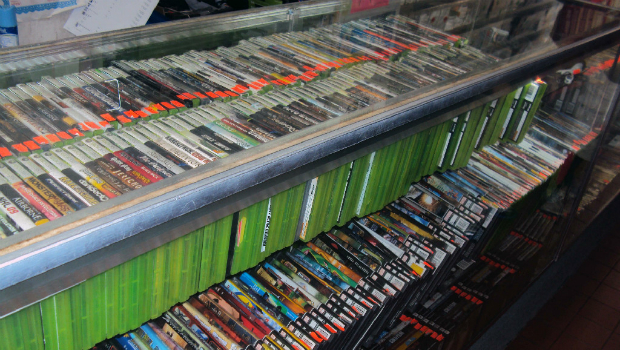Promoted from our community blogs!
[Dtoid community blogger TriplZer0 shares some insight into dealing with an all-too-common first-world problem. (Who knew I was actually depressed all this time?!) Want to see your own words appear on the front page? Go write something! –Mr Andy Dixon]
Ah, the holiday season. The time when many of us buy new games for ourselves or receive them as gifts. How many of you are familiar with this scenario: you unwrap the shrink wrap off a new game, eager to play it, and then your eye drifts over to the unplayed ones still on your shelf. You shudder when you think about them.
The backlog. The pile of shame. You know, those games. The “I’ll go back and play it someday” games. If you’re like me, you probably have more of those kinds of games on your shelf and on your hard drive than you’d like to admit. But it’s okay! You don’t need to be ashamed of your backlog anymore. You don’t have to beat yourself up for not finishing more games. I’m here as an officially licensed videogame therapist* to help you through the Five Stages of Backlog Grief.
Okay, so I’m not any kind of therapist. I just talk about videogames on the internet. This tongue-in-cheek model is roughly based on the famous Kübler-Ross model, or commonly known as the five stages of grief. Remember, if you have serious issues, you may want to seek professional help, but as far as the gaming world is concerned, this should help ease you to a state of clarity!

Denial
“My backlog’s not that bad.” “I still haven’t played games from the Steam Summer Sale two years ago, but I’ll get to them.” Backlog denial is the first stage an individual might experience when confronted with the truth of their growing backlog. It seems like every time Steam has a seasonal sale or I get an Amazon gift card, I add more and more games to my pile.
Denying that you have an ever-growing stack of games to play (I mean Steam isn’t ever going to stop having sales) is a defense mechanism, a way gamers convince themselves that everything is fine.

Anger
Once you get past denial, you move on to anger: at yourself for buying so many games, at Steam, GameStop, and Amazon for having great deals. Sometimes you might even feel misplaced anger directed at the games themselves. “If this game wasn’t so long I’d play it more!” “It’s the devs’ fault for making it too hard!”
If you find yourself around a gamer going through the anger stage of backlog grief, be patient with them. Know that they really aren’t mad at the games or platforms they’re berating. The anger will eventually pass.

Bargaining
This stage usually involves hope that somehow you can stave off this problem. “If I just had a couple more hours in the day, I could play all these games.” “I’ll trade (insert: time with friends, time for homework or school, etc.) if I could just finish some of these games.”
This stage is where you see that your backlog has eclipsed your ability to keep up with it, and you’re trying to buy some more time. But bargaining isn’t a long-term solution. How long could you keep it up if you sacrificed time with friends or family just so you could finish a few more games?

Depression
Once you realize bargaining is futile, it’s perfectly natural for the state of your backlog to depress you. “I’m never going to finish all these games. What’s the point?” “Why should I even buy games anymore?” Or perhaps more specifically in my case, “Why do I buy JRPGs anymore? I’ll never finish them if they’re over forty hours.”
For me this stage manifests itself more as a state of anxiety rather than depression. I’ll see how many games are in my backlog, and then feel crushing indecision. I know I should try to play some games to reduce my backlog, but I can’t decide which one to play. This makes me disengage from gaming or certain games for days or even weeks at a time. However, depression (anxiety) isn’t all bad, it shows “that the person has begun to accept the situation.”

Acceptance
And now we come to the final stage of backlog grief. This is where you tell yourself “it’s going to be okay.” You realize that there will always be more good/awesome/innovative/badass/etc. games coming out than any one person is able to play.
Rather than preparing you to accept an impending death like in the real version of these five stages, I think this stage puts you in a more enlightened state of mind. You feel okay with the state of your backlog, and you learn how to play games for the fun of it instead of out of some obligation to “beat all your unfinished games.”
For example, right now I have about eight games I “should” be playing (and dozens more waiting to be installed on Steam), but I keep going back to Skyrim. Why? Because it’s goddamned fun that’s why. Maybe I’ll never get to those other games, but that’s okay. It won’t hurt me in the long run as a person. Maybe I’ll miss out on some amazing experiences and memories, but I’ll get a chance to make some of my own by moving on and playing what I want.
So there you have it, the Five Stages of Backlog Grief. Of course, not all gamers go through these or in that particular order, but they’re still able to help someone harboring deep backlog shame or gaming indecision.





Published: Dec 12, 2012 07:30 pm